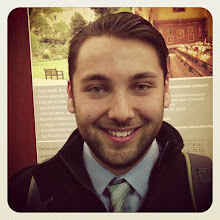We heard from a Czech woman who grew up in Krumlov, and the talked to us about the town’s history. She felt very conflicted about the German issue. She admitted that she personally felt an inherent aversion to Germans and the German language, but at the same time, she felt very guilty that they were driven from their homes. At the same time, she talked to us about how she was fearful that Germans would return to the Sudetenland to re-claim their homes, even though they have no legal claim to them anymore. She told us that many of the German tourists in Krumlov visit their family homes, talk about how they want them back, and about how someday the Sudetenland will be German again. At the same time, within Germany itself, most of the refugees who fled their homes felt like outsiders once they arrived. They were considered racially German, but they were not culturally the same, they were distinct Sudeten Germans. However, because of the guilt they feel for having supported the Nazis, many of them didn’t feel comfortable talking about how they were wronged. Most people don’t even know about the German transfers, for this very reason; we don’t know how we understand it. Were the Sudeten Germans really hate-filled supporters of Nazism, or were they just deceived and disillusioned with their treatment by Czechoslovakia? Did they deserve to be driven from their homes, where there families had lived for hundred of years? Is being a German really incompatible with being a citizen of the Czech Republic? How should Germans today feel about what happened over sixty year ago? Are they still responsible for what their grandparents may have done during the war? Dealing with these questions is one of the reasons I really liked Český Krumlov, and also the reason I am traveling back to German-speaking lands in a few weeks. I plan on spending 3 days in Germany, 2 days in Austria, and 3 days in Switzerland and Lichtenstein. German speaking peoples have a unique character that somehow appeals to me, so I am hoping to learn more about it while I am there.
The town of Český Krumlov, it is an incredibly well preserved Renaissance town. As you can see in the map above, the heart of the city is essentially an island surrounded by a great bend in the Vltava River. On a cliff to one side of the river sits a huge castle, once the home to various German aristocratic families. The inner courtyards of the castle are covered in frescoes and murals, all wonderfully restored, from the Renaissance. The families of the castle were interested in alchemy and other esoteric traditions, so the walls are covered in obscure symbols and other mysterious motifs. Additionally, it is said that there is still a ghost who returns to the castle periodically to warn the residents of Krumlov of bad news or other omens. Here are some photos of the castle, outside and in, by night and day.
Another landmark of Krumlov is St. Vitus church, first built in the 14th century. The interior is beautifully decorated with painting, statues, and other decorative features.
Finally, the rest of the town is very quaint. It only takes fifteen minutes to walk all around the old-town, but it is wonderful, and surrounded by the river on every side. I really wish we had more time in Krumlov, it had a very appealing character. The residents were friendly, and the city is saturated with museums and art. There are also several nice restaurants, as well as some great shops. As small as it is, I still feel we didn’t quite do it justice.





















